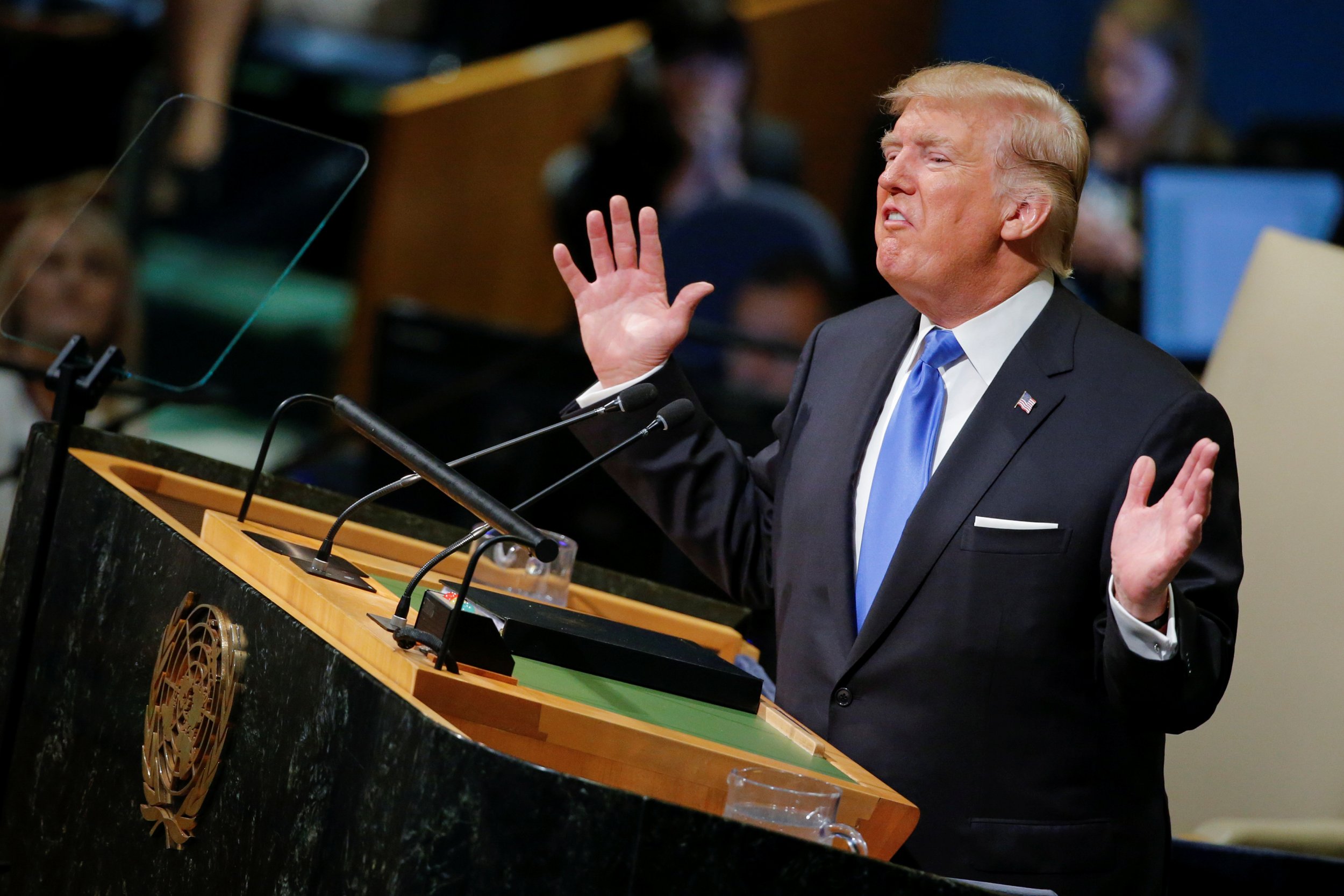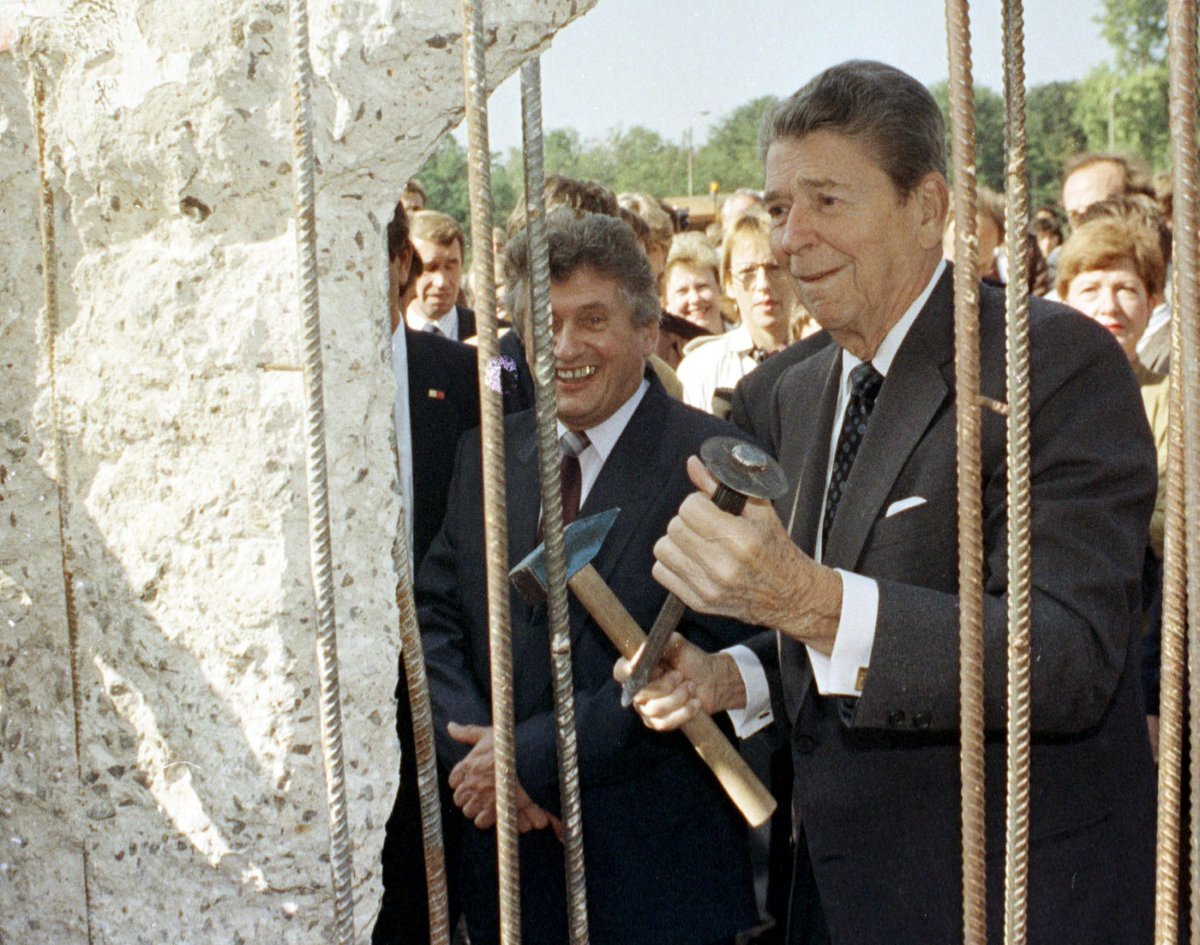
The U.S. faces an existential threat from the other side of the globe in the form of an authoritarian, communist government armed with weapons of mass destruction. The leader of the free world must take a stand.
The year was 1987...and 2017.
Former President Ronald Reagan delivered his famous "Tear Down This Wall" speech in Berlin 30 years ago. At the time, it wasn't necessarily big news. Some even dismissed it as overblown, a bit of rhetorical showboating. In retrospect, though, it ended up encapsulating Reagan's much-vaunted challenge to the "Evil Empire"—the Soviet Union.
Will the same be true of President Donald Trump's withering, Elton John-themed attack on North Korea at this week's U.N. General Assembly?
History has yet to decide, but for now, political observers aren't so sure.

"'Rocket Man' is on a suicide mission for himself," Trump said of dictator Kim Jong Un on Tuesday, using the title of Elton John's 1972 ballad to mock the North Korean leader's aggressive missile program. "The U.S. has great strength and patience, but if it is forced to defend itself or its allies, we will have no choice but to totally destroy North Korea."
Reagan struck a much different tone during the now-famed speech in which he exhorted then-Soviet leader Mikhail Gorbachev to release his country's grip on Eastern Europe: "Mr. Gorbachev, tear down this wall! I understand the fear of war and the pain of division that afflict this continent—and I pledge to you my country's efforts to help overcome these burdens," he said. "To be sure, we in the West must resist Soviet expansion. So we must maintain defenses of unassailable strength. Yet we seek peace; so we must strive to reduce arms on both sides."
Overall, "Trump is much more confrontational in dealing with North Korea than Reagan was with the Soviet Union," Darrell West, vice president and director of governance studies at the Brookings Institution, tells Newsweek.

He said he doesn't consider how Trump mocked Kim on the world stage as very Reaganesque: The late president, West says, "criticized Soviet leaders, but never belittled them or sought to humiliate them in public. That approach carries a lot of risk. When you resort to junior high school behavior, you may get a junior high response from your opponent."
To be fair, the situations aren't completely analogous.
"North Korea has a leader who appears crazy and irrational, while the Soviet Union leadership was experienced and cautious in its international dealings," West says. "This gave Reagan an edge over Trump, because he didn't have to fear some crazy action that could set up a nuclear exchange."
Trump did get kudos for his speech from some corners, including Israel's Benjamin Netanyahu and former presidential hopeful Mitt Romney.
President Trump gave a strong and needed challenge to UN members to live up
— Mitt Romney (@MittRomney) September 19, 2017
to its charter and to confront global challenges.
Larry Sabato, director of the University of Virginia Center for Politics, tells Newsweek that while comparisons are often drawn between Reagan and Trump, that's usually wishfully done by Trump supporters who want to liken their president to one of the most popular commanders in chief in U.S. history.
The similarities, he added, are often exceptionally superficial, such as their ages or backgrounds in the entertainment industry.
"Reagan had governed the nation-state of California for eight years. Trump bought real estate and ran The Apprentice. I could go on, but won't," Sabato says. Simply, "One cannot imagine Reagan speaking before the U.N. and calling Gorbachev a 'Rocket Man'" for a variety of reasons, he said.
Bottom line: "Reagan wrote many of his own speeches, and coined many of his own memorable phrases," Sabato says.
"No doubt, Trump came up with 'Rocket Man' all by himself, but I doubt it will live in history quite the way Trump wants it to. Reagan could be genuinely eloquent. The word 'eloquent' will never be associated with Donald Trump."
Uncommon Knowledge
Newsweek is committed to challenging conventional wisdom and finding connections in the search for common ground.
Newsweek is committed to challenging conventional wisdom and finding connections in the search for common ground.
About the writer
Celeste Katz reports on the White House and national affairs for Newsweek. She is based in New York, where she ... Read more
To read how Newsweek uses AI as a newsroom tool, Click here.








